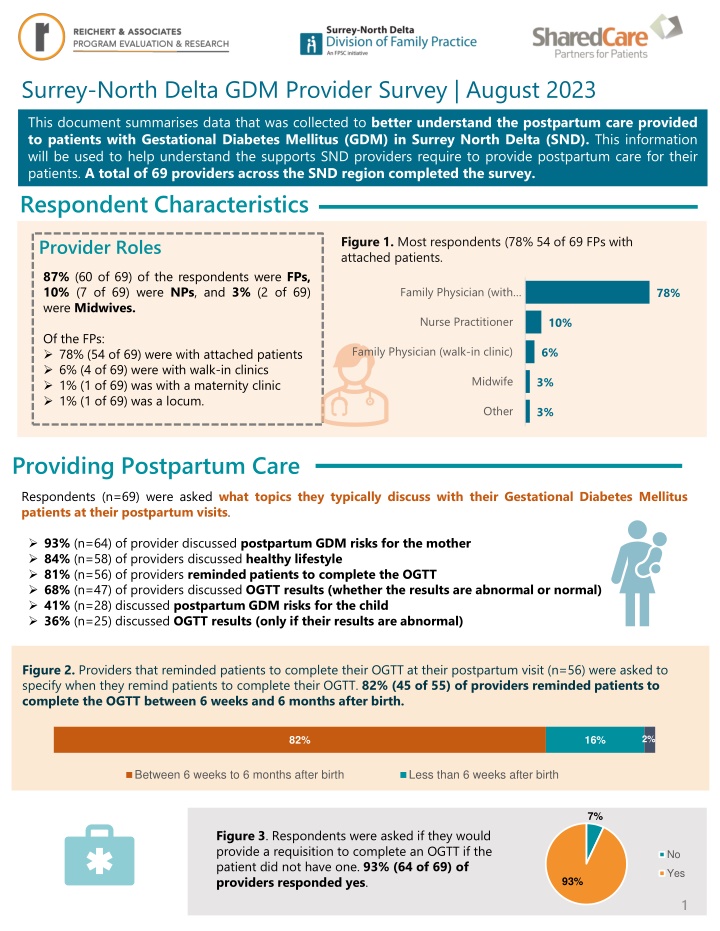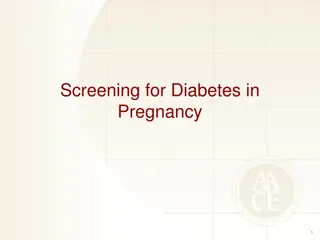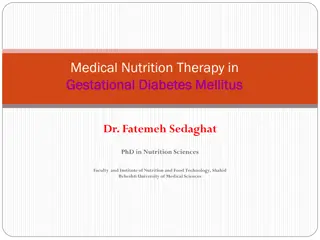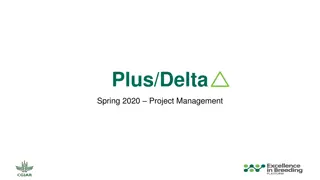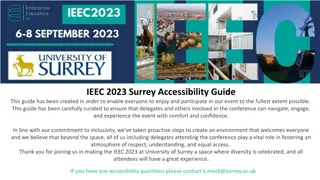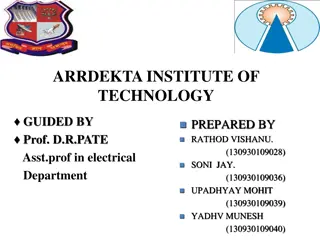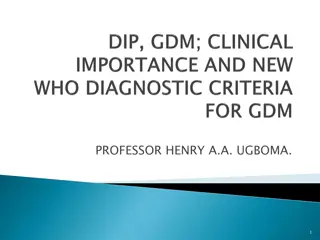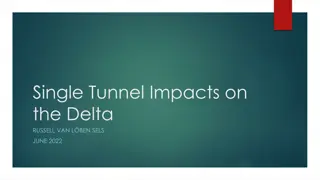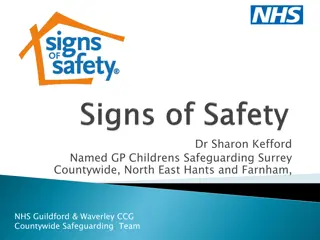Surrey-North Delta GDM Provider Survey Data Summary
This document summarizes data collected from 69 healthcare providers in Surrey-North Delta regarding postpartum care for Gestational Diabetes Mellitus (GDM) patients. It includes provider characteristics, topics discussed during postpartum visits, providers' actions regarding patient care, confidence levels in providing care, and challenges faced in postpartum care for GDM patients.
Download Presentation

Please find below an Image/Link to download the presentation.
The content on the website is provided AS IS for your information and personal use only. It may not be sold, licensed, or shared on other websites without obtaining consent from the author.If you encounter any issues during the download, it is possible that the publisher has removed the file from their server.
You are allowed to download the files provided on this website for personal or commercial use, subject to the condition that they are used lawfully. All files are the property of their respective owners.
The content on the website is provided AS IS for your information and personal use only. It may not be sold, licensed, or shared on other websites without obtaining consent from the author.
E N D
Presentation Transcript
About the survey About the survey Surrey-North Delta GDM Provider Survey | August 2023 This document summarises data that was collected to better understand the postpartum care provided How to ace a to patients with Gestational Diabetes Mellitus (GDM) in Surrey North Delta (SND). This information will be used to help understand the supports SND providers require to provide postpartum care for their patients. A total of 69 providers across the SND region completed the survey. Respondent Characteristics Figure 1. Most respondents (78% 54 of 69 FPs with attached patients. Provider Roles 87% (60 of 69) of the respondents were FPs, 10% (7 of 69) were NPs, and 3% (2 of 69) were Midwives. Family Physician (with 78% Nurse Practitioner 10% Of the FPs: 78% (54 of 69) were with attached patients 6% (4 of 69) were with walk-in clinics 1% (1 of 69) was with a maternity clinic 1% (1 of 69) was a locum. Family Physician (walk-in clinic) 6% Midwife 3% Other 3% Providing Postpartum Care Respondents (n=69) were asked what topics they typically discuss with their Gestational Diabetes Mellitus patients at their postpartum visits. 93% (n=64) of provider discussed postpartum GDM risks for the mother 84% (n=58) of providers discussed healthy lifestyle 81% (n=56) of providers reminded patients to complete the OGTT 68% (n=47) of providers discussed OGTT results (whether the results are abnormal or normal) 41% (n=28) discussed postpartum GDM risks for the child 36% (n=25) discussed OGTT results (only if their results are abnormal) Figure 2. Providers that reminded patients to complete their OGTT at their postpartum visit (n=56) were asked to specify when they remind patients to complete their OGTT. 82% (45 of 55) of providers reminded patients to complete the OGTT between 6 weeks and 6 months after birth. 2% 82% 16% Between 6 weeks to 6 months after birth Less than 6 weeks after birth 7% Figure 3. Respondents were asked if they would provide a requisition to complete an OGTT if the patient did not have one. 93% (64 of 69) of providers responded yes. No Yes 93%
About the survey About the survey Providing Postpartum Care Respondents (n=69) were asked to share what they would do if a patient had an OGTT requisition but did not complete the OGTT. Respondents shared they would do the following: Of providers with unattached patients, 3 of 8 suggested they would tell the patient to follow-up with their Family Physician and not provide a requisition if they did not complete the OGTT. Give them another OGTT requisition (64%, n=44) Order their A1C (29%, n=20) Order their fasting blood glucose (28%, n=19) No further testing recommended (3%, n=2) Other (12%, n=8) See Appendix A. Confidence in Care Provided Respondents were asked to rank their confidence for certain aspects of providing care on a scale of 1 to 5 with, 1 being not confident at all and 5 being extremely confident. Figure 6. Confidence levels having conversations about reducing the risk of diabetes postpartum (i.e., lifestyle, diet). Figure 5. Confidence levels providing culturally safe postpartum care, in general. Figure 4. Confidence levels providing postpartum care for patients who had GM. 5 (Extremely confident) 5 (Extremely confident) 33% 22% 5 (Extremely confident) 17% 4 42% 4 43% 4 45% 3 20% 3 28% 3 29% 2 3% 2 3% 2 6% 1 (Not at all confident) 1 (Not at all confident) 1% 4% 1 (Not at all confident) 3% Average score: 3.8 4.0 3.7 Average score: Average score: Respondents were asked to explain their rating for the above questions and comment on any challenges they experience in providing postpartum care to patients with GDM. The following was shared: (Appendix B) I am also a CDE [Certified Diabetes Educator] which is why my rating is confident Provider I can advise them all but patients revert whatever they do traditionally in their own culture as their family and friends dictate. Rather frustrating. Provider It is difficult for new moms to go for 2 hours OGTT test post partum due to lack of childcare supports. Provider
About the survey About the survey Jim Pattison Outpatient Care and Surgery Centre (JPOCSC) Diabetes and Pregnancy Clinic Providers were asked to share their experiences communicating with the JPOCSC Diabetes and Pregnancy Clinic. Figure 8. 68% (47 of 69) of providers were not aware the JPOCSC Diabetes and Pregnancy Clinic will only follow-up in the case of an abnormal result. Figure 7. 68% (47 of 69) of providers reported being happy with the amount of communication, they received from the JPOCSC Diabetes and Pregnancy Clinic. 68% 32% 32% 68% No, I was not aware of this Yes, I was aware of this No, would like more Yes Figure 9. 84% (57 of 69) providers reported being able to connect with JPOCSC Diabetes and Pregnancy Clinic if they had questions, but this varied in frequency with only 15% indicated that they are always able to connect with the Clinic and nearly 70% indicating being able to connect with them sometimes or rarely . 16% 15% 19% 50% No, never Yes, always Yes, but rarely Yes, sometimes Confidence Providing Care Figure 10. Respondents were asked how confident they were in taking over as the patients primary care provider at handover from the JPOCSC Diabetes and Pregnancy Clinic. 5 (Extremely confident) 23% 4 38% 3 36% 63% (39 of 62) providers reported they were confident (rating of 4 or 5) taking over care for patients from the JPOCSC Pregnancy Clinic. 2 0% Diabetes and 1 (Not at all confident) 2% Providers were asked to share how else they would need help to feel more confident in supporting patients postpartum. They shared the following: (Appendix C) Refresher for GPs on risks for baby and mother, highlights to educate patient Provider More resources as to the testing they need in the future e.g., do they need yearly blood work? Provider
About the survey About the survey Appendix A. If a patient had an OGTT requisition, but does not complete the OGTT, which of the following do you do? Other: How to ace a Depends on why they did not complete. Depends why they did not complete it. Encourage to at least due fasting blood glucose if unable to manage 2-hour OGTT. Fasting glucose and A1c if patient not willing to do OGTT. If I have contact them I remind them get it done as it s important for their health care. Patients are given a reminder but we have no manpower to chase them down if they don t do it. Remind them again during the well-child visits. Remind them to do OGTT. Appendix B. Please use the space below to explain your ratings above or any challenges you experience in providing postpartum care to patients who had GDM: Advise patients to check at 6 weeks can be included as of part of their 6 week check up. I am also a CDE which is why my rating is confident. I can advise them all I can but patients revert whatever they do traditionally in their own culture as their family and friends dictate. Rather frustrating. I don t have many GDM patients. I had GDM thus confident above. It is difficult for new moms to go for 2 hours OGTT test post partum due to lack of childcare supports. Mostly patients not willing to do OGTT due to repeat blood taking and needing to drink sugar water. My patients are older so I don t do much post partum care. No. None. Not high volume. not enough time. Poor communication from Diabetic clinic for their expectations of follow up. So far no challenge other than some language barrier at times. Usually will provide patient DM info from pathways. Women are often tired and busy and often do not complete their GTT in a timely manner
About the survey About the survey Appendix C. If a patient had an OGTT requisition, but does not complete the OGTT, which of the following do you do? Other: How to ace a Discharge summary. Handouts to help guide patients and or doctors. I currently do not take on new patients. More resources as to the testing they need in the future e.g., do they need yearly blood work? More resources from JPOCSC. Need better communication & more resources. None. Nothing else. Patients who do not have PCP to be better supported. Please send patient reminder (email/text) to get blood work done. Pre-conception and prenatal education about GDM to hopefully prevent GDM to begin with and access to a dietitian. Quick reference and table as a resource. Refresher for GPs on risks for baby and mother, highlights to educate patient. Resource, education evening re: risks to mom and baby, diet and lifestyle support resources. Resources in paper format. Resources or handouts to provide to patients for education and to help improve their lifestyle and reduce risk factors. Update on resources periodically.
